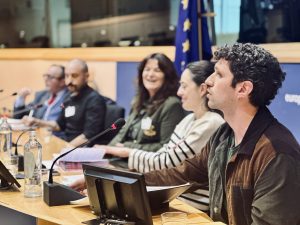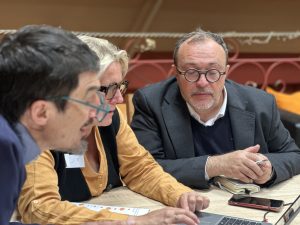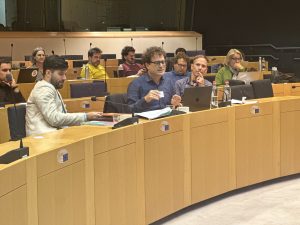A Powerful Closing Chapter: PHOENIX Final Conference Brings Participation, Policy, and the Planet Together in Brussels
The final conference of the PHOENIX project, held on June 4–5, 2025, in Brussels, marked a key moment in our shared journey to rethink democratic participation in the face of the ecological and climate crisis. Over the course of two days — and across two emblematic locations, Atelier 29 and the European Parliament — participants from across Europe came together to reflect on what we’ve learned, share tools and practices, and envision what comes next.
More than just a formal conclusion to three years of collaborative work, the event represented a space of convergence between researchers, policy actors, civil society organizations, and European institutions. It was rich in energy, dialogue, and emotion — a true testament to the strength of the PHOENIX network and to the urgency of the challenges we collectively face.
Day 1 – Sharing Experiences and Imagining Futures
The first day took place at Atelier 29, in the heart of Brussels. The objective was to create a space for exchange and strategic foresight, connecting the lessons of the PHOENIX pilots to future forms of democratic innovation.
We began with a presentation of the PHOENIX project and its pilots, offering an overview of participatory experiments from Portugal to Latvia, and from Italy to the Netherlands. The session also introduced several “sister projects”, working across Europe on similar goals — a crucial step in building synergies and fostering mutual learning beyond the project itself.
In the afternoon, two World Café sessions brought participants into smaller, focused groups. The first round centered on drawing lessons from the field: what worked, what didn’t, and what surprised us. These reflections highlighted the importance of context-sensitive methodologies, the need for ongoing support to participants, and the creative potential of combining digital tools with face-to-face interaction.
The second round focused on future scenarios and actions: How do we make participatory democracy a lasting part of ecological transition policies? Participants developed ideas for scaling successful practices, embedding democratic procedures into environmental governance, and creating spaces for citizens’ voices to shape policy from the local to the European level.
The day ended with a lively plenary where groups reported back their ideas and commitments — a moment that captured both the diversity of perspectives in the room and the shared ambition to move forward together.
Day 2 – Dialogue with the European Institutions
If Day 1 was about reflection and imagination, Day 2 brought our message into the core of EU policy-making. Held at the European Parliament, the morning session, titled PHOENIX Meets the EU Institutions, opened a structured dialogue between project partners and institutional representatives, including Members of the European Parliament, Commission policy officers, and civil society leaders.
In two dedicated sessions, we explored how to improve citizen participation in political decision-making and how to enhance public involvement in the Green Transition. Participants shared both methodological insights and concrete policy recommendations: from inclusive recruitment strategies to long-term support for participatory processes, from AI-assisted deliberation to legal frameworks that guarantee citizen input in environmental planning.
The afternoon session, titled The Green Deal is a Common Challenge, showcased the final recommendations of PHOENIX and provided space for critical reflection on how to integrate participatory democracy into the long-term implementation of the European Green Deal.
After an opening round of institutional greetings by key partners — including MEP Benedetta Scuderi, Giovanni Allegretti (Centro de Estudos Sociais, Coimbra), Sophie Guillain (Res Publica), and Massimiliano Tarantino (Fondazione Giangiacomo Feltrinelli) — two high-level panels followed.
The first focused on co-designing the ecological transition, presenting the PHOENIX Tangram Approach, a framework for structuring inclusive, multi-level deliberative processes. Panelists examined how the climate crisis demands democratic innovation as much as technical solutions — and how public institutions can act as enablers rather than bottlenecks.
The second panel addressed the need to mainstream participation into European policy and planning. Drawing on the experience of researchers and policy analysts, the discussion pointed to structural reforms and capacity-building investments needed to make participation the norm rather than the exception in environmental governance.
The event closed with an open conversation with the audience, underscoring once again that participation is not a checkbox — it’s a democratic right and a vital lever for effective, legitimate climate action.
A Collective Milestone
The PHOENIX Final Conference was not only a high-level event but also a deeply human one. Participants expressed appreciation for the collaborative spirit, the depth of exchange, and the generosity of ideas shared throughout the two days. Many left the Parliament inspired — and determined to keep pushing the boundaries of what participation can mean in times of ecological urgency.
The conference marks a milestone for the PHOENIX community, but also a beginning: a renewed call to action, a stronger network, and a clearer understanding of the road ahead.
We look forward to sharing videos, key takeaways, and the final policy recommendations in the coming weeks. In the meantime, we extend our heartfelt thanks to all who joined us in Brussels and to those who continue building this movement across Europe.
Let’s keep the fire burning.



Follow us on: